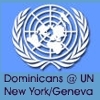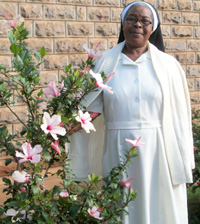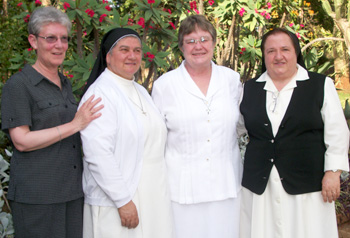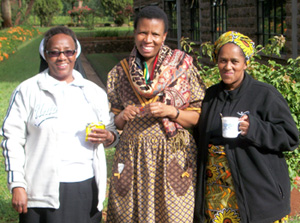

| BRIEFING - June 8 , 2011 | To learn more about the Millenium Development Goals, click on the graphic Past Briefings: May 11, 2011 April 27, 2011 April 6, 2011 March 23, 2011 March 9, 2011 February 9, 2011 January 26, 2011 January 12, 2011 December 29, 2010 December 15, 2010 December 1, 2010 |
||||
‘Divine blessings’: Meeting Dominican sisters in Africa
I have recently returned from Nairobi, Kenya, where I had the great privilege to attend the Assembly of Dominican Sisters of Africa, from May 16–23. I was invited by Sr. Michael Mduli (Dominican Congregation of Montebello, South Africa), who is the Continental Coordinator for Africa for the Coordinating Council of Dominican Sisters International (DSI). The visit was just one of the fruits of working closely with DSI over the past few years, in an effort to establish stronger ties between our sisters worldwide and the work of the United Nations NGO Representative. I was joined by Sr. Maria Fabiola Velasquez Maya (Dominican Sister of the Presentation), coordinator of DSI; Sr. Toni Harris (Sinsinawa), our International Co-Promoter for Justice and Peace; and Sr. Lucia Fernandez (Missionaries of St. Dominic, Rome), who is the Coordinator of Dominican Volunteers International (DVI). We each had the opportunity to share what we do in the name of the Dominican Family, and to invite our sisters in Africa into more intentional collaboration with us, as together we reflected on the theme, “Preparing Our Dominican Future in Africa with Realism, Daring and Hope.”
For me personally, it was a wonderful learning experience about Africa, in general, as well as an opportunity to literally connect the issues I deal with here at the UN with flesh-and-blood people on the ground. Without going into too much detail, permit me to give you a brief overview of the reality of our sisters in Africa. The continent is divided into four zones:
The coordinators and the justice promoters for each zone offered reports. Some of the most significant challenges the sisters face in their respective zones include the following:
Sr. Petronille Kayiba (Dominican Missionaries of the Rosary), from the Democratic Republic of Congo, offered a keynote address in which she urged the sisters to make use of social analysis and theological reflection, in their efforts to see, judge and act, in response to the signs of the times. She reminded us that the future is always before us, though it is “unknown.” And she cautioned us not to allow feelings of fear and discouragement to cloud our vision here in the present. Indeed, the future is only open to us if we listen to, and are open to the present. She then invited the sisters to reflect on the greatest challenges facing the continent of Africa today. The responses were many, and included the following:
Though these problems may seem daunting, we were reminded of an old African proverb which the Bishops of Africa cited in their latest Synodal document: “an army of well-organized ants can bring down an elephant.” The Bishops go on to say, “We should not be afraid of, less still be discouraged by the enormity of the problems of our continent.” And Sr. Petronille then added, “ there is no reason for despair in Africa. Divine Blessings are here.”
It was very inspiring to pray and reflect with the sisters regarding their lived reality in Africa, and to witness their deep desire to bring about a fullness of life for their brothers and sisters on the continent. They hold dear their identity as Dominicans, and as preachers. Sr. Petronille encouraged the sisters to move towards a unity of preaching as both a “service of charity,” and a “proclamation of the Word.” The importance of freeing the word of women, and thereby freeing The Word, is an essential aspect of our Dominican vocation in today’s world. In her presentation, Sr. Toni Harris reminded us all that “Working for justice is not optional, nor is it simply a dimension of our lives. Rather, it is a dynamic perspective that informs both our being and our doing. This perception shapes our prayer, our choices, our relationships, our lived commitments and our work.” I think I speak for Toni, as well as for myself, when I say that it was a humbling experience for us to give “justice-oriented” presentations to these good sisters, who live in the midst of, and make valiant efforts to respond to, situations of grave injustice on a day-to-day basis. They are truly an inspiration for us as we continue to participate in the pursuit of justice in our own unique ways. And as Sr. Petronelle pointed out, in Africa, “Divine Blessings are here…” Many of those Divine Blessings are in the persons of our Dominican sisters throughout the continent.
|
Dominican Leadership Conference
Building relationships and collaborating in the mission of preaching the Gospel
29000 West Eleven Mile Road
Farmington Hills MI 48336
248-536-3234 Contact: Executive Director



